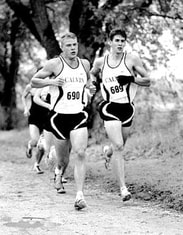Competing for status brings anxiety

It seems that in order to achieve love and respect we often have to compete with other men. We have to demonstrate our success at something. We have to know where we are going, what we are doing and be able to solve problems along the way. When we men meet in any social context there is an instant scrabble for a kind of 'alpha male' position. This is often a sad and brutal affair between several hurt, infantile males, requiring some kinds of violence to settle the ranking, though we are all somehow drawn in. At other times we engage in subtle complex one-upmanship determining the rules of the game play. Once the male hierarchy is settled then we can, reluctantly, uncomfortably proceed. There can be several rankings working alongside each other ... the strongest, the wealthiest, the most charismatic, whoever can hold more drink, the most technically informed ... and we still seem to look up to footballers, banksters, pop stars and media celebrities ... whilst quietly inside we are anxiously comparing ourselves as failures.
In older times, before cinema, television and modern media, our role models for successful men would have been father, uncle, the chap along the road or one of the local heroes. This slightly healthier role of 'alpha male' would have related to those who could best protect and provide for the given community. The current role models of celebrity, sporting, spiritual, political, financial or scientific success seem so remote and impossible to most of us. These models are often disconnected from or even opposed to satisfaction of any real human needs, but we still feel ourselves as failures compared to them and we desperately want success, recognition and love within these destructive criteria... these are the norms.
If we are reasonably emotionally healthy then we will be able to appreciate the simple successes in our daily lives and relationships. We will have found some normal group or activity where we feel reasonably recognised and happy.... raising our children, simple trades and crafts, working our garden, social activities in our community, ... In small steady human steps we will each build our special lives, finding success in realistic achievements and building great lives on our personal and cultural inheritance.
However, when we get fixed on the unachievable concepts of success portrayed throughout the media then we will always be anxious failures. In this way we remain addicted, competing slaves to the destructive patriarchal and capitalist models of success.
In older times, before cinema, television and modern media, our role models for successful men would have been father, uncle, the chap along the road or one of the local heroes. This slightly healthier role of 'alpha male' would have related to those who could best protect and provide for the given community. The current role models of celebrity, sporting, spiritual, political, financial or scientific success seem so remote and impossible to most of us. These models are often disconnected from or even opposed to satisfaction of any real human needs, but we still feel ourselves as failures compared to them and we desperately want success, recognition and love within these destructive criteria... these are the norms.
If we are reasonably emotionally healthy then we will be able to appreciate the simple successes in our daily lives and relationships. We will have found some normal group or activity where we feel reasonably recognised and happy.... raising our children, simple trades and crafts, working our garden, social activities in our community, ... In small steady human steps we will each build our special lives, finding success in realistic achievements and building great lives on our personal and cultural inheritance.
However, when we get fixed on the unachievable concepts of success portrayed throughout the media then we will always be anxious failures. In this way we remain addicted, competing slaves to the destructive patriarchal and capitalist models of success.
Anxiety, failure, shame and depression

Men's sense of failure leads us into anxiety, shame, depression, illness, addictions, violences and suicide. This failure is often at a profound unconscious level. That is, we are not really sure what we are failing at or why. The sense of failure we experience is often a complex mix: failure in my relationships, not enough good sex, failure as a father, not happy at work, not earning enough, .... Most of this is not our fault at a personal level. Our social context has sold us impossible models of success. But, as men, we take it very personally. We feel we have to know how to fix every problem on our own. We cannot share it with anyone or show our vulnerability, so we end up in a lonely downward spiral.
The consumer economy is dependent on 95% of the population being addicted to competing for impossible fantasies of happiness. So we work, take out mortgages and debt, buy stuff we do not need, ... have to work harder to pay the bills, ... have brief consumerist holidays to patch us up to go back to unsatisfying work. Of course we feel failure, shame and depression. We buy lottery tickets and gamble with the fantasy of success in the dream. We play games where our team can win, giving us a momentary buzz. We might have 1000 friends on social media, but only actually speak to 3 of them. But at least we can have the newest 72" TV screen ... a buzz of success for a moment ... on our credit card. ... and so on it goes.
Without any other models of success, trapped in the patriarchal model, it is no surprise that we can feel anxiety, failure, shame and depression. Indeed it is perfectly sane and normal. These emotions are there to slow us down, to get us off the escalator. But it is not so easy ... as we slow down then we begin to feel the emotions. We feel fear and anger. We feel the fear of failure, of rejection, of punishment ... no way out, no visible paths to our dreams of success. We feel furious at the impossibility of it all. We are indignant about those who control our lives and those who seem to have success without any merit. We are angry about the hypocrisy and lies we were sold ... but we blame ourselves ... as men we should know how to be a success.
We can only contain limited amounts of fear and anger .... so it is better to go into depression or addiction. In this way we slowly commit suicide, blaming ourselves and swallowing the poison. The other unhealthy response is to explode, discharging the tension against others around us in types of violence, vengeance, stealing, vandalism, ... Most of us are trapped in cycles between these unhealthy opposites.
There will be maybe 2% of us who are so driven by our pathological fear that we drag ourselves up the ladder to 'success' to become managers, leaders, gurus, .... clear about our 'hard work', merit and right to this place and ferociously defending it. And there might be another 2% who by accident of birth, genes, circumstances, ... simply doing what comes naturally, find ourselves with success within these paradigms, with realism and humility, hardly able to believe it, aware of the flimsy pillar upon which we stand. The rest of us are doing our best between these points.
As we get to the extreme tension of failure, shame and depression, we have swallowed enough poison and blame so that we are sure to get ill in different ways, or we explode, hurt someone and get into trouble. These are life’s wise gifts. They are windows of opportunity for us to stop and reflect, to find help, containment and balance. In these moments we are ready to have a wider look at ourselves. When we are just out of hospital, still weak and unable to compete then we might be ready to consider simpler, more accessible ideas of success. In prison or under court orders there is serious containment, we are slowed down by force and the law asks us to reflect.
Whilst these are opportunities they are also moments of extreme vulnerability that require some sensitive and gentle containment, love and guidance. It is time to find therapy or a men's group.
The consumer economy is dependent on 95% of the population being addicted to competing for impossible fantasies of happiness. So we work, take out mortgages and debt, buy stuff we do not need, ... have to work harder to pay the bills, ... have brief consumerist holidays to patch us up to go back to unsatisfying work. Of course we feel failure, shame and depression. We buy lottery tickets and gamble with the fantasy of success in the dream. We play games where our team can win, giving us a momentary buzz. We might have 1000 friends on social media, but only actually speak to 3 of them. But at least we can have the newest 72" TV screen ... a buzz of success for a moment ... on our credit card. ... and so on it goes.
Without any other models of success, trapped in the patriarchal model, it is no surprise that we can feel anxiety, failure, shame and depression. Indeed it is perfectly sane and normal. These emotions are there to slow us down, to get us off the escalator. But it is not so easy ... as we slow down then we begin to feel the emotions. We feel fear and anger. We feel the fear of failure, of rejection, of punishment ... no way out, no visible paths to our dreams of success. We feel furious at the impossibility of it all. We are indignant about those who control our lives and those who seem to have success without any merit. We are angry about the hypocrisy and lies we were sold ... but we blame ourselves ... as men we should know how to be a success.
We can only contain limited amounts of fear and anger .... so it is better to go into depression or addiction. In this way we slowly commit suicide, blaming ourselves and swallowing the poison. The other unhealthy response is to explode, discharging the tension against others around us in types of violence, vengeance, stealing, vandalism, ... Most of us are trapped in cycles between these unhealthy opposites.
There will be maybe 2% of us who are so driven by our pathological fear that we drag ourselves up the ladder to 'success' to become managers, leaders, gurus, .... clear about our 'hard work', merit and right to this place and ferociously defending it. And there might be another 2% who by accident of birth, genes, circumstances, ... simply doing what comes naturally, find ourselves with success within these paradigms, with realism and humility, hardly able to believe it, aware of the flimsy pillar upon which we stand. The rest of us are doing our best between these points.
As we get to the extreme tension of failure, shame and depression, we have swallowed enough poison and blame so that we are sure to get ill in different ways, or we explode, hurt someone and get into trouble. These are life’s wise gifts. They are windows of opportunity for us to stop and reflect, to find help, containment and balance. In these moments we are ready to have a wider look at ourselves. When we are just out of hospital, still weak and unable to compete then we might be ready to consider simpler, more accessible ideas of success. In prison or under court orders there is serious containment, we are slowed down by force and the law asks us to reflect.
Whilst these are opportunities they are also moments of extreme vulnerability that require some sensitive and gentle containment, love and guidance. It is time to find therapy or a men's group.